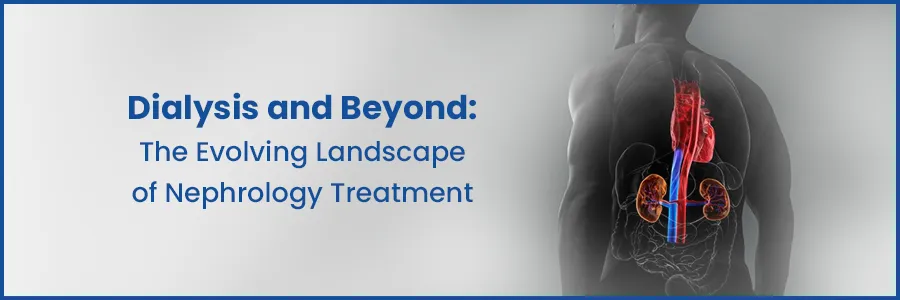Categories
- Cardiology 84
- Dermatology 45
- Endocrinology 33
- ENT 16
- Fertility 190
- Gastroenterology 78
- General-Medicine 81
- Gynecology 80
- Hematology 19
- Infectious-Diseases 33
- Neurology 52
- Oncology 34
- Ophthalmology 23
- Orthopedics 69
- Pediatrics 31
- Procedure 23
- Public-Health 144
- Pulmonology 59
- Radiology 8
- Urology 68
- Wellness 161
- Woman-and-child 77

What is Dialysis Treatment?
Dialysis and Beyond: The Evolving Landscape of Nephrology Treatment
- Introduce the importance of nephrology in managing kidney-related conditions.
- Highlight the significance of dialysis as a conventional treatment option for kidney failure.
- Mention that advancements in nephrology have led to new and innovative treatments beyond dialysis.
Understanding Dialysis:
- Explain what dialysis is and why it's necessary for individuals with kidney failure.
- Describe the two main types of dialysis: hemodialysis and peritoneal dialysis.
- Discuss the process, benefits, and challenges associated with dialysis treatment.
Secure your health with a second opinion. Make informed decisions and book your appointment today!
Get A Second OpinionChallenges of Conventional Dialysis:
- Highlight the limitations of traditional dialysis, such as time commitment, lifestyle restrictions, and potential side effects.
- Discuss the impact of dialysis on patients' quality of life and the need for improved treatment options.
Advancements in Dialysis Technology:
- Explore recent technological innovations in dialysis machines and equipment.
- Discuss how these advancements aim to enhance the effectiveness and convenience of dialysis treatment.
Beyond Dialysis: The Evolving Landscape:
- Introduce emerging treatments that offer alternatives to or complement traditional dialysis:
- Kidney transplantation: Discuss the benefits and challenges of kidney transplantation as a long-term solution.
- Wearable artificial kidneys: Explain how wearable devices that mimic kidney function are being developed.
- Implantable bioartificial kidneys: Explore the concept of bioengineered kidneys for improved quality of life.
- Mention the importance of personalized treatment plans tailored to individual patient needs.
Pharmaceuticals and Nephrology:
- Discuss pharmaceutical breakthroughs in nephrology treatment, such as medications that target specific kidney-related conditions.
- Highlight ongoing research to develop medications that can slow the progression of kidney disease.
Regenerative Medicine and Kidney Health:
- Explain the concept of regenerative medicine in nephrology.
- Discuss the potential for using stem cells and tissue engineering to restore kidney function.
Ready to take control of your health journey? Book your appointment now and start your path towards wellness today!
Book an AppointmentLifestyle and Preventive Measures:
- Emphasize the role of lifestyle modifications in preventing kidney disease.
- Provide tips for maintaining kidney health through diet, hydration, and exercise.
Patient-Centered Care and Support:
- Discuss the importance of holistic patient care in nephrology.
- Highlight the role of support groups, counseling, and educational resources for patients and their families.
Conclusion:
The field of nephrology is rapidly advancing, moving beyond traditional dialysis treatment processes. While dialysis is used for the treatment of kidney failure, there is growing emphasis on early detection and personalized care to enhance kidney health outcomes.
Ongoing research is crucial in developing innovative therapies and improving existing treatments. Staying informed about these advancements and consulting healthcare professionals can help patients explore the best treatment options and achieve better results in managing kidney health.
Frequently Asked Questions
Dialysis is used to filter waste and excess fluid from the blood when the kidneys are unable to perform this function adequately.
The main types of dialysis are hemodialysis, which filters blood through a machine, and peritoneal dialysis, which uses the abdominal lining to filter blood.
Kidney transplantation involves replacing a failed kidney with a healthy one from a donor, offering a more permanent solution than ongoing dialysis.
Wearable artificial kidneys are portable devices that mimic kidney function, allowing patients to have continuous filtration while going about their daily activities.
Implantable bioartificial kidneys are engineered devices that combine living cells and artificial components to replicate kidney function within the body.
Yes, pharmaceutical research has led to medications that target specific kidney diseases and aim to slow their progression.
Maintaining a balanced diet, staying hydrated, exercising regularly, and avoiding excessive alcohol and smoking can all contribute to kidney health.
Regenerative medicine focuses on using stem cells, tissue engineering, and other techniques to repair or replace damaged kidney tissue.
As with any medical treatment, there are potential risks and benefits. It's important for patients to discuss potential side effects with their healthcare providers.
Patients can seek out healthcare providers who emphasize personalized treatment plans, open communication, and addressing their unique needs and concerns.
Yes, support groups, patient advocacy organizations, and online forums can provide valuable information, resources, and emotional support.

Categories
- Cardiology 84
- Dermatology 45
- Endocrinology 33
- ENT 16
- Fertility 190
- Gastroenterology 78
- General-Medicine 81
- General 6
- Gynecology 80
- Hematology 19
- Infectious-Diseases 33
- Neurology 52
- Oncology 34
- Ophthalmology 23
- Orthopedics 69
- Pediatrics 31
- Procedure 23
- Public-Health 144
- Pulmonology 59
- Radiology 8
- Urology 68
- Wellness 161
- Woman-and-child 77